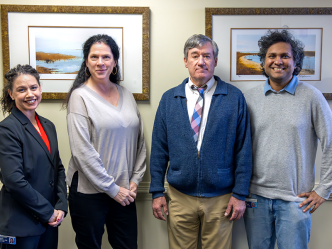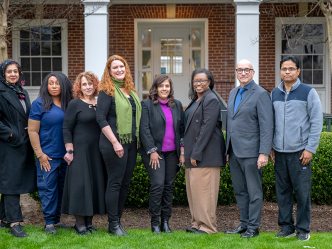The thrill of discovery. It’s exciting!
It’s why Evan Goldstein, PhD, wanted to do something with research as a profession. As a child of academics and witnessing this feeling in a research lab as a graduate student, he’s been around research most of his life and has seen the value firsthand.
“Undergraduate research matters a lot. Getting students in early with research is the best way for them to understand what life in a research lab and an academic institution means,” said Goldstein, an assistant professor in the Department of Biological Sciences in Augusta University’s College of Science and Mathematics.
Undergraduate students who pursue research during the early phases of their academic careers can learn many skills, ranging from soft skills like time management to scientific skills like utilizing a confocal microscope.

Quentin Davis, PhD, director of the Center for Undergraduate Research and Scholarship, said the thought of research can seem a little intimidating to students at first, but it’s worthwhile to pursue.
“Many students may find the word ‘research’ a little intimidating at first, but those who try it quickly learn that it’s a fun, hands-on way to get more involved in your studies,” Davis said. “Often, participation in research introduces you to new ideas and topics you never would have explored otherwise – a classic part of the collegiate learning experience.”
A personal tie to research
Goldstein has been at Augusta University since 2023. He currently has nine undergraduate students working in his lab, studying neurodevelopment and developmental brain injuries.
He said a diagnosis that his mom received when he was younger motivated him toward pursuing his research focus.
“When I was 7 or 8 years old, my mom was diagnosed with multiple sclerosis, which is a well-known neurodegenerative myelin disorder,” he said. “I always had an interest in this, as both of my parents were academics, and I was sort of enlightened to the academic world.”
According to the Mayo Clinic, multiple sclerosis occurs when the immune system attacks the protective sheath that covers nerve fibers, known as myelin. Myelin is a fatty substance around the nerve cells in the brain that provides metabolic and structural support to nerves, making connections with other cells. Myelination, the formation and development of myelin sheaths, mostly occurs after humans are born and continues well into adulthood.
A major focus of Goldstein’s lab is the pathogenesis and recovery of developmental brain injuries. The largest population of patients with developmental brain injuries is very pre-term babies, usually those born at 32 weeks or sooner, with around 1.5% of live-birth babies falling into this category. About one-third of these babies will develop a white-matter injury; white matter is where the preponderance of myelin is.
Goldstein’s lab uses a mice model by placing them in a low-oxygen environment to simulate babies born early with underdeveloped lungs. This creates a hypoxic injury and recreates a lot of the phenotypic changes seen in babies born prematurely with a white matter injury.
Research as a student assistant
Students like Isaac Bloom, a third-year undergraduate neuroscience major, appreciate the learning aspect of research as it helps them prepare for upper-level classwork.
“When you do research very early, it forces you to understand. By being exposed to so much so early, all these upper-level classes are very much simplified,” Bloom said.
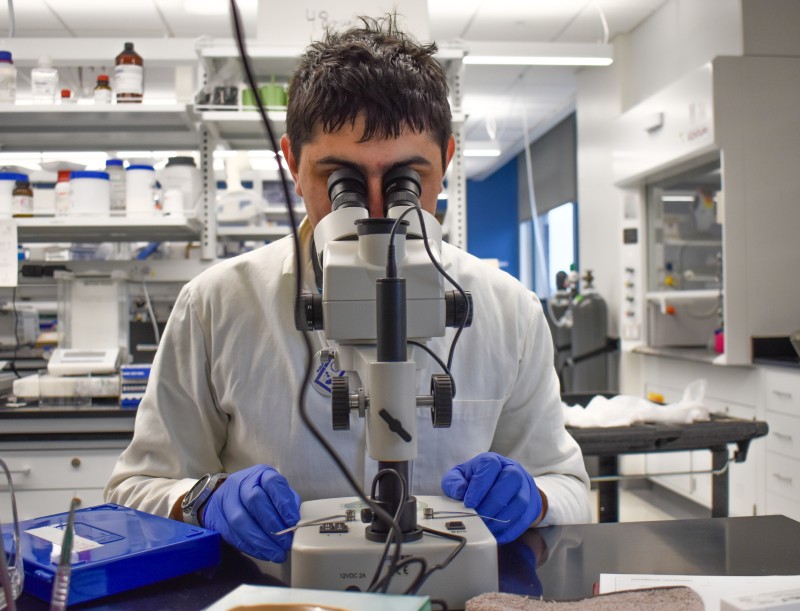
Bloom was the first lab assistant Goldstein hired. The neuroscience program was brand new when Bloom started working with Goldstein, and there were only two labs to choose from, so he said it was an easy decision to make, based on what he wanted to focus on. He said he enjoys working with Goldstein because, while having a young family, he still makes time for his student assistants, and Bloom has never heard him get mad.
Working as an EMT, Bloom said doing research has helped him learn that he’s not going to get things right the first time.
“Every procedure in our protocol books that I wrote, I feel like the only reason I could write those protocols well was because I messed up every single step, at least in one way or another,” Bloom said. “Just because you pass a class doesn’t mean you’re going to be a good doctor or EMT with your first patient; it takes time.”
Jasmine Baidoo, a fourth-year undergraduate cell and molecular biology major and a CURS Ambassador, agrees, adding she loves the ability to apply what she’s learned from the classroom to the lab and problem-solve something that matters to her.
“Being involved in research is like saying, ‘I recognize this real-world problem, and I’d like to find a way to fix it.’ It helps develop your problem-solving skills, not just in the research lab but in the classroom and the real world, too,” said Baidoo.
Baidoo has been working with Goldstein since her sophomore year and said she enjoys working with Goldstein because he does not overcomplicate things and is willing to go out of his way to help, however needed.

Baidoo said she was drawn to Goldstein’s lab, thanks to a personal connection she had to the problem the lab was looking to solve.
“I was a preterm baby; I was born at 6 months. I was put in an incubator for a long time before I was released to my parents,” Baidoo recalled. “Being able to take steps to help other preterm infants is something I really wanted to do, and that’s happening now.”
Both Bloom and Baidoo said that what they’ve learned in the classroom helps them apply what they learn in the research lab and vice versa. They encourage other students who may be interested in research to do it.
Goldstein said he admires the energy that his undergraduate assistants bring into the lab.
“Working with undergrads, while it’s not necessarily what we as faculty are trained for, I find it extremely rewarding,” said Goldstein. “They have this great enthusiasm that makes them fun to be around.”
A growing lab
Many faculty research mentors will take on two, sometimes three, additional student assistants. So how did Goldstein manage to attract nine undergraduate students to work with him?
He said he always knew he would be relying on undergraduate students in some capacity, based on previous experiences in graduate school. Goldstein laughed, saying he was surprised he had up to 10 students working with him when he first started at AU, jokingly saying you would’ve called him crazy for taking on this many students to work with.
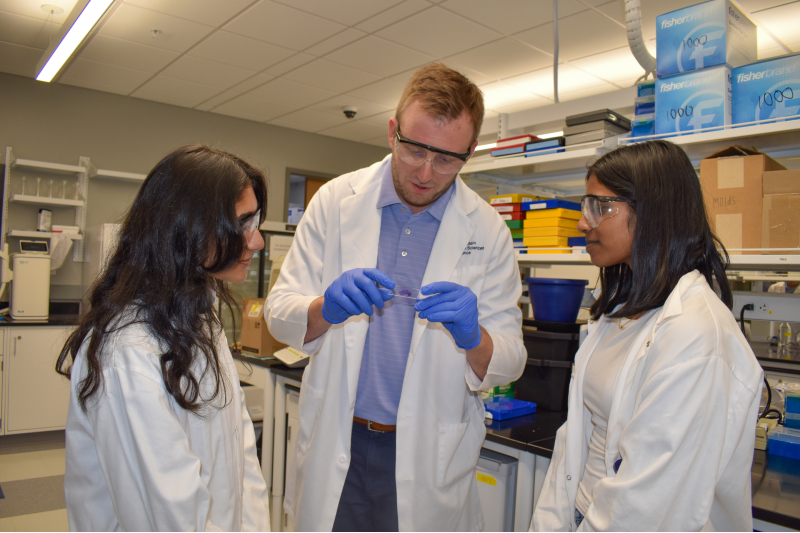
Goldstein believes it comes down to a few things that have contributed to the growth of his lab: interacting with undergraduates in his classes, participating in programs like CURS’ Summer Scholars Program and connecting with the right student groups like the Honors Program to promote being involved in his lab.
He also believes in giving students a program they feel is important and worthwhile and giving them a sense of ownership over a manageable project. A larger-than-usual lab allows his team to have more bite-sized projects that are ultimately a part of a bigger problem to analyze.
“I think that’s really important that students aren’t just here volunteering time washing dishes or doing tasks in the lab that they know how to do, but they don’t know why they’re doing it,” Goldstein said.
Additionally, Goldstein credits a well-written project overview and word-of-mouth “advertising” from his lab assistants’ positive experiences with why his lab has grown as much as it has.
As Goldstein’s lab has grown gradually over the last two years, the existing members of the lab have been able to train the newer members of the lab as they’ve joined, which Goldstein appreciates. He admits having had a difficult time turning students away from working in his lab at first but has grown more selective about whom he chooses to be a part of his lab.
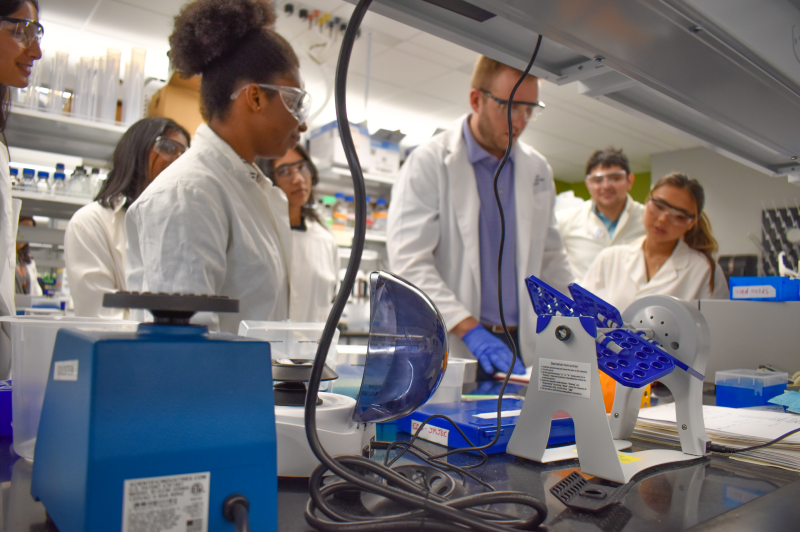
If other faculty research mentors are looking to grow their labs, Goldstein advises them to be flexible with the students and to remember they’re in the early stages of their training. Set expectations with students from the start.
Once they express interest in the lab, Goldstein also advises having conversations with the students but let them do most of the talking. He said this has helped him, as the faculty mentor, to know more about the students and figure out where they would best fit within the work of his lab.
“Mentors like Dr. Goldstein are hidden gems of this university,” Davis said. “We have so many talented and caring faculty who have dedicated their career to a particular area of study but simultaneously are dedicating themselves to our students. The relationships built when you work together to solve problems and answer meaningful questions take the student-faculty relationship to a different level. We have a rich community of mentors and mentees here at AU.”
 Augusta University
Augusta University

